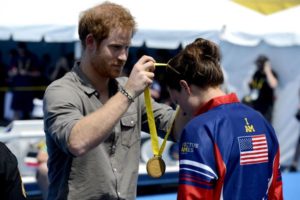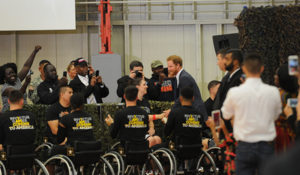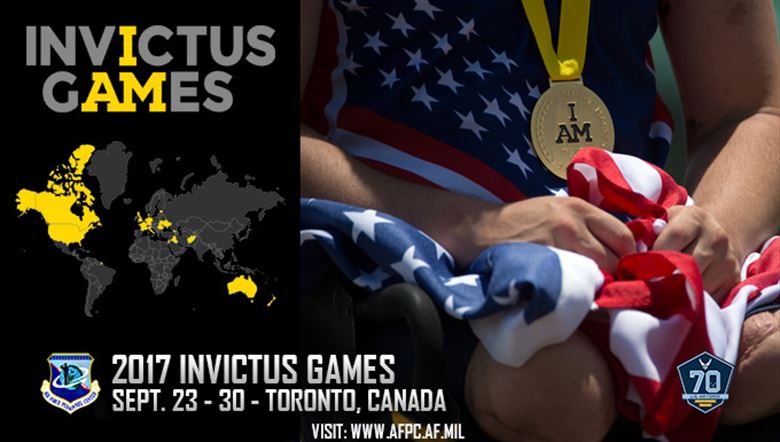01 November 2018
Invictus Games
Harry’s triumph.
By Lynda Goetz
 Earlier this week someone posted a short video on my Facebook page. It was the one which some of you may have seen of former Royal Marine, Mark Ormerod, describing how, at 24 years old, he was injured serving in Afghanistan; how as a result he became Britain’s first triple amputee and how after the initial despair he has gone on to become an Invictus star and inspired others through sport and social media. It is both incredibly humbling and very moving.
Earlier this week someone posted a short video on my Facebook page. It was the one which some of you may have seen of former Royal Marine, Mark Ormerod, describing how, at 24 years old, he was injured serving in Afghanistan; how as a result he became Britain’s first triple amputee and how after the initial despair he has gone on to become an Invictus star and inspired others through sport and social media. It is both incredibly humbling and very moving.
Mark Ormerod is one of the 26 athletes who have already competed in past games for the British team, who went to Sydney this year with 46 new British competitors (along with over 400 athletes from around the world supported by 1000 family members) to take part in the Fourth Invictus Games. Prince Harry’s wife Meghan, who has not put a foot wrong in her new role since she married Harry in May and became the Duchess of Sussex, sang the praises of all those involved when she spoke carefully and caringly at the closing ceremony on Saturday. Although not herself from a military family or background she had clearly ‘got’ how important the close bonds of the military were to those who had served and how they were to some extent recreated by the camaraderie and competition of the specially tailored sporting events. She clearly felt moved to be welcomed into the ‘Invictus family’.
 Prince Harry, the founder of the Invictus Games, took to the stage after his wife to deliver an equally passionate speech in which he too paid tribute to all those involved. He emphasised that it is not only the science which has enabled these veterans to recover and go on to achieve, but the fact that mental health is a key to recovery. “Our competitors” he said, “had helped turn the issue of mental health from a sad story to an inspiring one. They want to live rather than just be alive”. He told his audience that their example went beyond the military community; that it was about more than their stories of recovering from injuries or illness; it was about their example “of determination, of optimism, of strength, honour and friendship or, as the Aussies call it, mateship.”
Prince Harry, the founder of the Invictus Games, took to the stage after his wife to deliver an equally passionate speech in which he too paid tribute to all those involved. He emphasised that it is not only the science which has enabled these veterans to recover and go on to achieve, but the fact that mental health is a key to recovery. “Our competitors” he said, “had helped turn the issue of mental health from a sad story to an inspiring one. They want to live rather than just be alive”. He told his audience that their example went beyond the military community; that it was about more than their stories of recovering from injuries or illness; it was about their example “of determination, of optimism, of strength, honour and friendship or, as the Aussies call it, mateship.”
Prince Harry started the Invictus Games in 2014. It was inspired by the Warrior Games founded in 2010 and organised by the United States Department of Defense for injured, wounded or ill service personnel and veterans. The first Invictus Games was held in London with 14 participating nations. That number had increased to 18 by the time the Games in Sydney opened on 20th October this year. It is clearly of massive help in inspiring and motivating those who have suffered life-changing injuries or events and giving them, as one competitor said, “a reason for getting up in the morning and a reason for going to bed at night.” It shows how the power of sport can be of help, not just physically, but psychologically and socially.
 Prince Harry has also been instrumental in drawing attention to Mental Health in general. With brother Prince William and sister-in-law Kate they set up Heads Together in 2016 to make society in general more aware of mental health issues and those issues less of a taboo subject. As Prince Harry said in his Sydney speech, “Asking for help is courageous… In the moment you admit you are struggling, you take that first step towards a better future, for you, and your friends and your family.”
Prince Harry has also been instrumental in drawing attention to Mental Health in general. With brother Prince William and sister-in-law Kate they set up Heads Together in 2016 to make society in general more aware of mental health issues and those issues less of a taboo subject. As Prince Harry said in his Sydney speech, “Asking for help is courageous… In the moment you admit you are struggling, you take that first step towards a better future, for you, and your friends and your family.”
This week in his Budget, the Chancellor Philip Hammond seems to have conceded that we do indeed have an issue with mental health that needs confronting and financing; one which, in spite of a promise of dramatic change six years ago, still leaves many without the help they need. Whether or not austerity is really over and whether or not the Chancellor should be ‘splashing the cash’ at this point, this is one measure which will probably enjoy universal support. Quite how the funding will work in practice is not really made clear (and Theresa May had, of course, already rather stolen the Chancellor’s thunder on this matter earlier in the year by announcing a £20bn package of funding to celebrate 70 years of the NHS); nevertheless, the specific mention of mental health measures is at least a step in the right direction. Whether the Chancellor will go down as leaving a legacy in this area is another matter. Harry and William on the other hand are, according to David Beckham, an Ambassador for the Games, doing ‘something incredible… the legacy that the boys are leaving and that the boys are leading is very special’. Well, yes. Possibly not how most of us might have put it, but then we’re not on ‘mateship’ terms with ‘the boys.’


